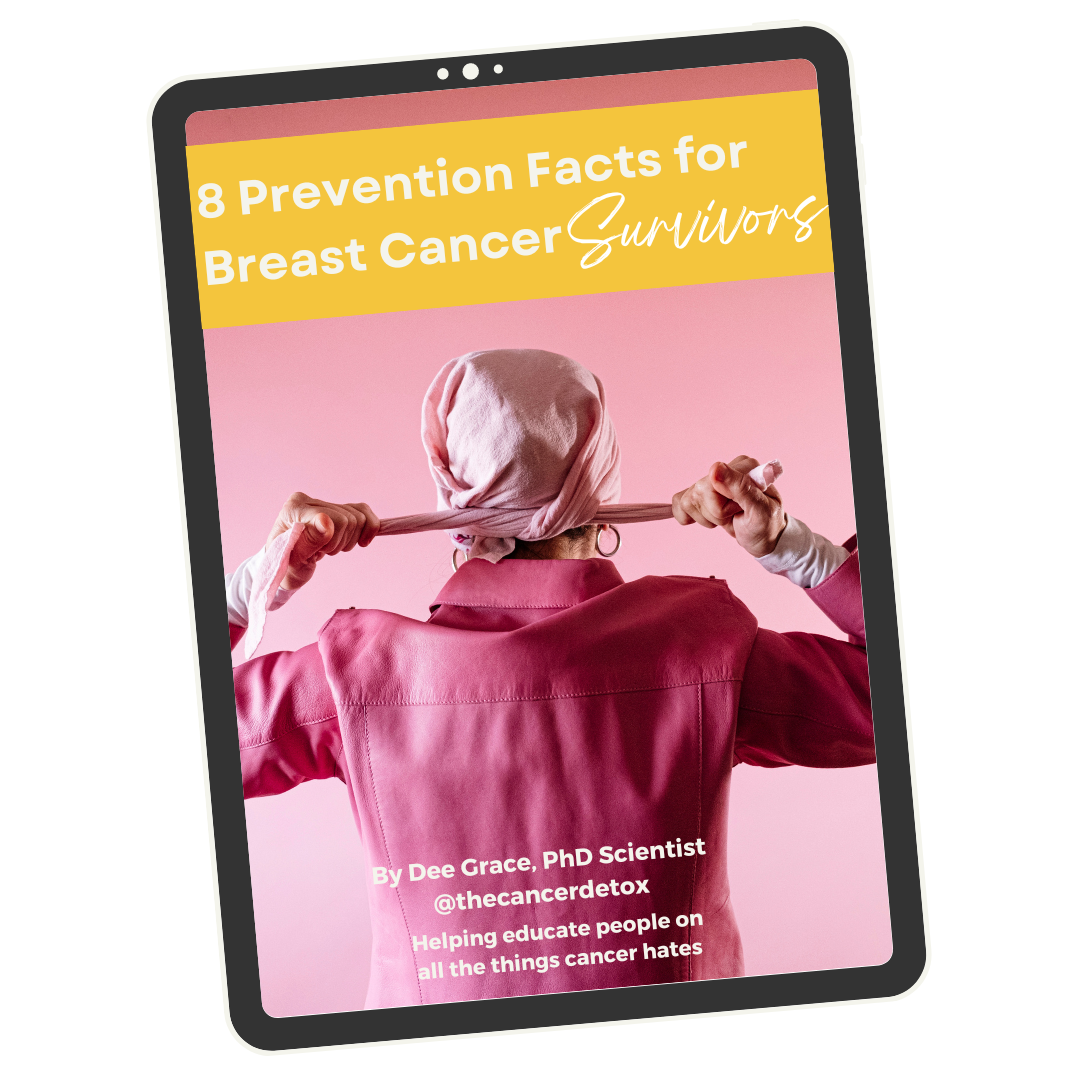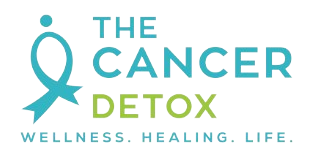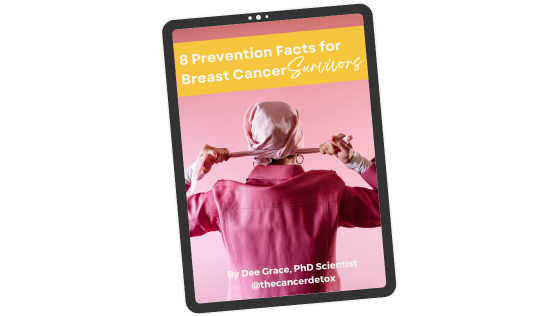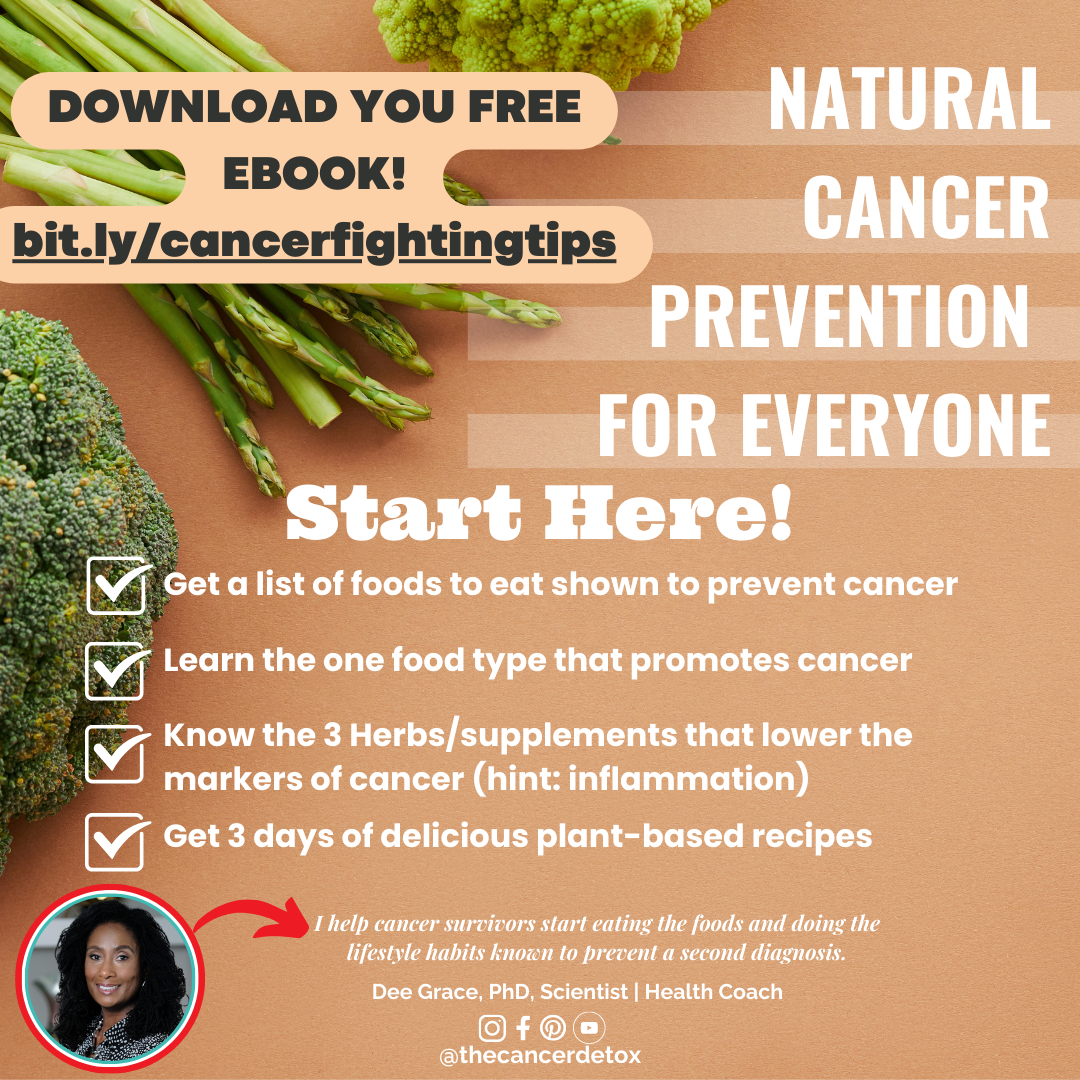
How to Get Started with a Breast Cancer Diet: 3 Cancer Fighting Foods Backed by Science that Every Patient Should Consider
A breast cancer diet for survivors is one of the top questions I get asked by clients. We will explore the top 3 foods that can be included in this type of diet and the science-based facts on how they help prevent breast cancer recurrence.
INTRODUCTION
By far, the top question I get from a woman newly diagnosed with breast cancer is, “What do I eat?” My informal surveys reveal breast cancer patients ask this question because they are concerned about: 1) avoiding foods that may have caused the breast cancer, and 2) not knowing about certain cancer-fighting foods that can help prevent a breast cancer recurrence.
As a Cancer Coach and health educator, I direct them to what the scientific evidence has shown in breast cancer patients. Below is a list of 3 breast cancer-fighting foods that have been shown to lower the risk of breast cancer recurrence, death from any disease, or change the breast cancer tumor.
IN THIS ARTICLE, YOU WILL:
- Get a list of three foods to consider for your breast cancer diet (if you are a breast cancer patient or survivor)
- If you like this info, learn more about the foods and lifestyle changes that have helped breast cancer survivors lower their risk of recurrence in the FREE e-Book “8 Breast Cancer Prevention Facts for Survivors” which includes a 3-day breast cancer diet meal plan and recipes
3 BREAST CANCER-FIGHTING FOODS
1. VEGETABLES
As a Cancer Coach, vegetables are the one food group that I highlight to breast cancer patients because it has good scientific evidence to back it up. Whether a woman eats all types of vegetables, or specific types, such as cruciferous and green leafy vegetables (which can contain some types of cruciferous vegetables like cabbage and kale), the evidence suggests that eating vegetables should be part of a breast cancer diet.
All Vegetable Types:
- The Women’s Healthy Eating and Living (WHEL) study found that all types of vegetables could be promising breast cancer-fighting foods. Over 3,080 breast cancer survivors were questioned about their vegetable intake. The women in this study were diagnosed with their initial breast cancer diagnosis 23 months, or longer, before being enrolled in the trial. They were also taking the drug tamoxifen
- Compared to women who ate the highest amounts of vegetables had a lower risk of a breast cancer recurrence, 44%, compared to women who ate the lowest amount of vegetables [1]
Cruciferous Vegetables:
- These are some of the most common types of vegetables eaten in the American diet (e.g., broccoli, cabbage). They have been extensively studied and are considered a cancer-fighting food with solid scientific evidence to back it up. Sow what does the evidence say for breast cancer survivors?
- In The Nurse’s Health Study (NHS) I and II, which surveyed 8,927 women over 40-plus years, cruciferous vegetables decreased the risk of death by any disease by 13% when breast cancer survivors ate at least one serving per day. The women in this study were not all exclusively taking the drug tamoxifen, like the women in the WHEL study [2].
- In the Women’s Healthy Eating and Living (WHEL) study, breast cancer survivors who were taking tamoxifen and ate the highest amount of cruciferous vegetables reduced their risk of a breast cancer recurrence by 35% compared to women who ate the lowest amount of these vegetables [1]
Green Leafy Vegetables:
- Leafy green vegetables are another type of vegetable that includes lettuces (e.g., Romaine lettuce, Boston lettuce, kale) that has benefits in a diet for breast cancer. In the NHS, breast cancer survivors that ate two servings of green leafy vegetables a day had a 20% lower risk of dying from any disease, including cardiovascular disease (CVD) [2].
2. BLUEBERRIES
- Blueberries have long been touted as a food that fights cancer. In the Nurse’s Health Study analysis, breast cancer patients and survivors that ate at least two servings of blueberries a week lowered their risk of death due to breast cancer recurrence by 25%. They also reduced their risk of death by any disease by 17% [2]
- The women ate blueberries for 12 months straight after their breast cancer diagnosis
- There were over 1,000 women who were included in this study analysis, a sizeable number in which to have some confidence in these
3. FLAXSEEDS
These seeds might be another food to add to a breast cancer diet because they appear to change cancer on a cellular level, similar to cruciferous vegetables. What are flaxseeds? They are essential sources of the following nutrients:
- Omega-3 fatty acids (aka – healthy fats)
- Antioxidants
Flaxseeds are an essential source of antioxidants for women. Antioxidants are substances that remove cellular waste and lower inflammation in the body. They are also crucial for a healthy brain, joint, and gut health.
A recent study of women newly diagnosed with breast cancer found that flaxseeds could reverse growing breast cancer tumors [3]. The women in this study were diagnosed with breast cancer based on a biopsy (where a sample of the breast tissue with the tumor is extracted from the breast) and were asked to eat a muffin containing 25 g of flaxseed (about two tablespoons). A separate group of women newly diagnosed with breast cancer were also asked to eat a muffin, but it did not contain flaxseeds (considered a “placebo group”).
After eating 30 flaxseed muffins every day for 30 days, the women in this group had the following results:
- Increased cell death of the cancer cells compared to women who did not eat flaxseeds
- Decreased production of HER2 cancer types (which is a very aggressive breast cancer) compared to women who did not eat the flaxseeds
- Less growth and proliferation of breast cancer cells compared to women who did not eat the flaxseeds
The researchers who conducted the study stated, “Our results therefore suggest that the intake of flaxseed has the potential to delay disease progression of pre-invasive or invasive breast cancer by changing the phenotype of the cancer cells to a less aggressive form.” [3]
As always, this is a science-based list of breast cancer-fighting foods, and if you are diagnosed with breast cancer, discuss with your healthcare provider any changes to your post-breast cancer diagnosis.
Here’s To Your Best Health!
Dee Grace, PhD

Hi! I am Dee Grace Ph.D., Scientist and Coach at The Cancer Detox. My career in cancer research has allowed me to work with doctors to find new treatments for this disease. I brought my knowledge to help patients get better care from their doctors during their cancer treatment process, so the focus is on improving their survival outcomes and reducing the financial burden. If you are a cancer patient Schedule a complimentary call with me now to discuss how to reduce your financial burden and 5 questions every patient needs to ask their doctor after a diagnosis (spots fill up quickly, so schedule soon!).
I also ignite people’s passion to adopt a “prevention first!” mindset. Why? Because, so you don’t have to experience the long-lasting health and financial setbacks a cancer diagnosis causes. My new book “Cancer Prevention: Diet and Lifestyle Factors that Reduce Your Risk” focuses on cancer fighting foods and how to adopt a cancer fighting diet.
REFERENCES
- Thomson C, et al. Vegetable itnake is associated with reduced breast cancer recurrence in tamoxifen users: a secondary analysis from the Women’s Healthy Eating and Living Study. Breast Cancer Research and Treatment. 2011;125:519-527.
- Farvid MS, et al. Postdiagnostic fruit and vegetable consumption and breast cancer survival: prospective analyses in the Nurses’ Health Studies. Cancer Res. 2020;80:5134-5143.
- Thompson L, et al. Dietary Flaxseed Alters Tumor Biological Markers in Postmenopausal Breast Cancer. Clin Cancer Res 2005;11(10)





